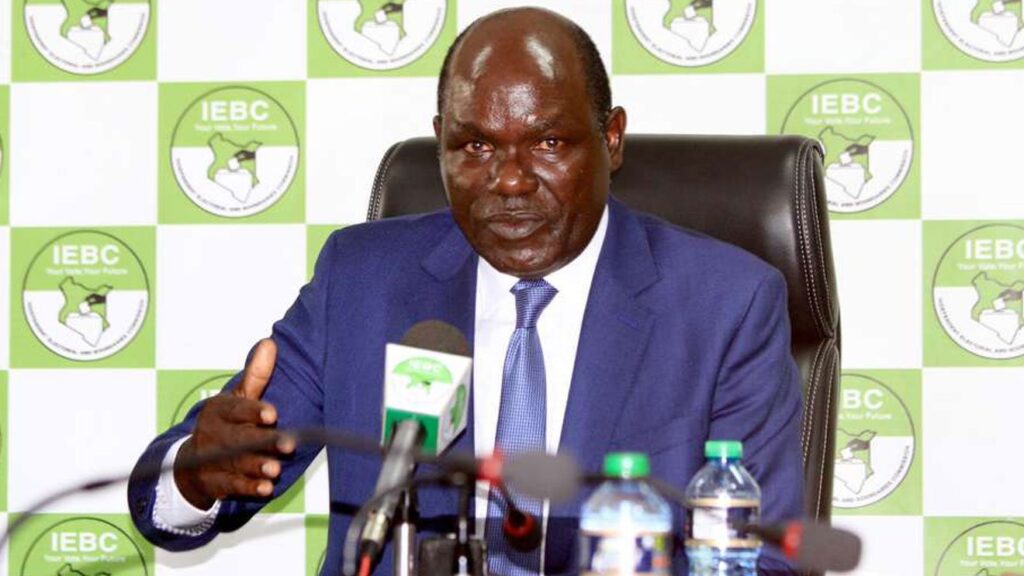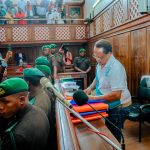
Kenya’s Independent Electoral and Boundaries Commission (IEBC) on Monday rolled out a voter registration drive targeting between six and seven million new voters as the country prepares for the August 2022 general elections.

IEBC Chairman Wafula Chebukati says In the first phase covering 30 days, the electoral body is targeting to register at least 4 million of the new voters, with another exercise set for January next year if the target is not met. Mr Chebukati says the aim is to increase the number of registered voters from the current 19.6 million to 26.9 million that is if the IEBC meets its 7.2 million new voter target.
“We urge all eligible Kenyans who have not registered as voters to turn up in large numbers and register,” Chebukati said.

According to figures provided by the Commission, Kenya currently has 19,687,885, as of May 2021. Despite the commission lamenting over the shortage of the biometric voter registration kits required for the exercise, it has deployed at least 3 kits to each of the 1,450 wards to facilitate the exercise.
The IEBC warned that delay in budgetary support may interfere with the progress of the Pre-Election Cycle which includes the voter registration exercise. Last month, Mr Chebukati raised fears that insufficient funding could scuttle key operations meant to help facilitate a tamper proof poll. During a recent engagement forum with Faith Based Organizations in Nairobi, Mr Chebukati also indicated the Treasury had only availed KSh26.4 billion leaving the agency with a KSh14.6 billion deficit to attain a fully funded budget of KSh40.9 billion. However some lawmakers argue that the electoral body has enough funds to finance the registration exercise.
“EBC has been given enough money to register new voters among those who have obtained IDs, as well as those who have IDs and have not yet registered as voters.” said Kieni MP Kanini Kega, who is also the Chairman of the National Assembly’s Budget Committee.
IEBC Chair Chebukati, however still argued on the need for more funds for the electoral body saying,
“The law says that you cannot have more than 700 voters in a polling station. We’re now targeting to register more than 6 million voters that will mean we will increase our polling stations from 40,833 to 53,000 plus polling station. This means we shall employ more election officials,”

In Mt. Kenya, which has in recent weeks been a hot bed of political activity, IEBC is aiming at registering 670,297 new voters, and another 648, 752 new voters in the Eastern part of the country; in the capital city Nairobi, some 517, 238 new voters will be enlisted. In the Rift Valley region, which has the highest number of counties, IEBC is targeting 1,069, 842 eligible voters, as part of preparations for the election. The electoral body also says that it plans to undertake voter registration in other parts of the country, as also nationwide mass voter registration for the diaspora in December this year. The diaspora exercise is mainly targeted at South Sudan, USA, United Kingdom, Canada, Qatar and the United Arab Emirates are the newly listed countries after meeting the minimum requirement of 3,000 voters. The diaspora vote has been of significance to the elections in Kenya, and this was evident in the 2017 General Elections where Kenyans in Uganda, Tanzania, Rwanda, Burundi and South Africa are said to have taken part.
The commission will also be carrying out an audit of the current register to weed out ghost voters and those that have passed away; a new voter register to be used in the 2017 election is expected to have been gazetted by May 2, 2022. It is said that first time voters can easily tilt the scale in the presidential vote, and so many aspirants seeking to replace President Uhuru Kenyatta after the expiry of his term, are said to be pushing youth friendly ideas, in an attempt to woo the voting bloc who are said to account for more than half of the population.






